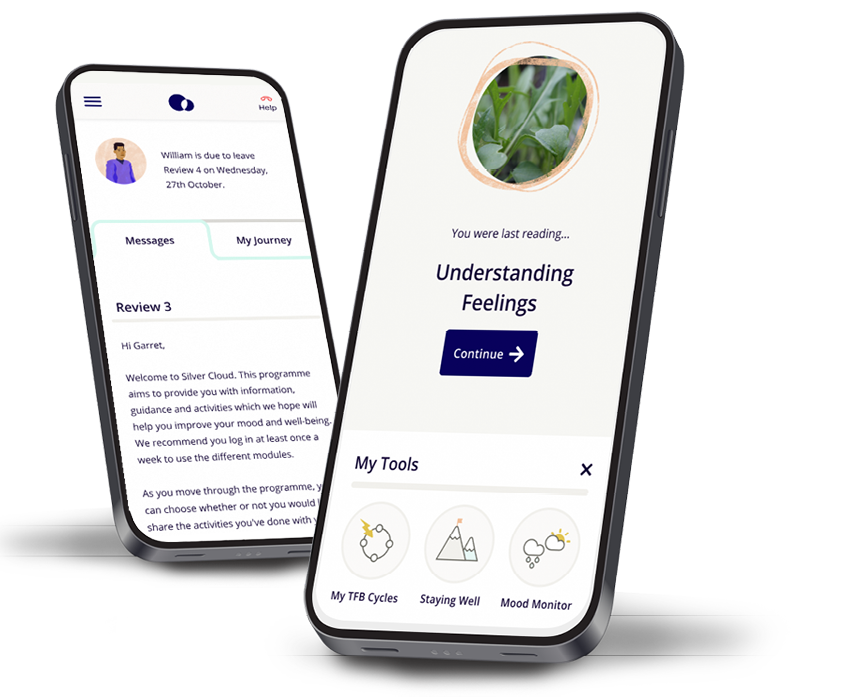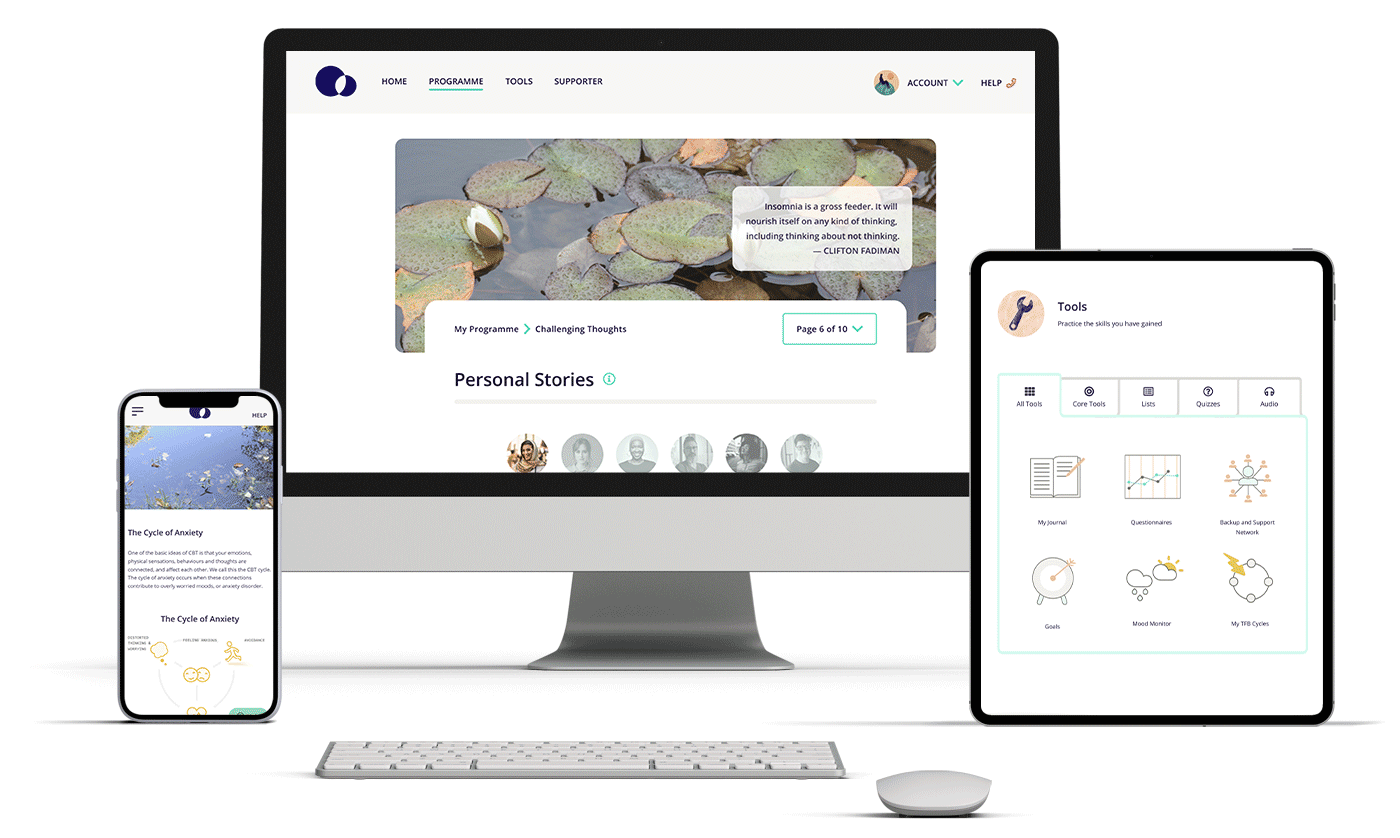How NHS Berkshire is utilising digital therapy to support parents and guardians during the perinatal period
-
Up to 20% of new and expectant mums are affected by perinatal mental illness
-
140K% parents and caregivers could be experiencing perinatal mental health issues each year
-
94% user satisfaction of users who provided feedback on how satisfied with the programme said they either ‘agreed’ or ‘strongly agreed; they were satisfied.
Up to 20% of new and expectant mums are affected by perinatal mental illness
140K% parents and caregivers could be experiencing perinatal mental health issues each year
94% user satisfaction of users who provided feedback on how satisfied with the programme said they either ‘agreed’ or ‘strongly agreed; they were satisfied.
Background
Berkshire Healthcare NHS Foundation Trust provides combined mental health and learning disabilities services as well as physical community healthcare services such as health visitors and school nurses, working across the whole of Berkshire. It established one of the first IAPT (Improving Access to Psychological Therapies) services in the country, in 2008: Talking Therapies Berkshire. The Trust is rated ‘outstanding’ by the CQC.
Within Talking Therapies, there are dedicated perinatal champions who work closely with these specialists to deliver in-house training to help therapists assess and treat IAPT patients with perinatal mental health issues.
Perinatal mental health problems are those which occur during pregnancy or within two years following the birth of a child. Perinatal mental illness affects up to 20% of new and expectant mums and covers a wide range of conditions. In the UK in 2019, there were 712,680 births registered, which means around 140,000 mums, and in addition other caregivers, could be experiencing perinatal mental health issues each year.
The scale of perinatal mental health is therefore significant and requires prioritised and immediate help when it is identified. It has been highlighted within the NHS Long Term Plan as an area for further development and investment.
Perinatal mental health problems are those which occur during pregnancy or within two years following the birth of a child.

The Challenges
The experience of people with perinatal mental health challenges mirrors several major issues faced by sufferers of other mental health conditions:
- There remains stigma and shame around perinatal mental health;
- There is often a concern from patients that they are ‘not sick enough’ to warrant specialist support;
- There is a lack of availability of the right information to help patients discern what is going on and to recognise what is an expected reaction to the birth of a child and what is considered a concern which requires help;

- The experience of being a new parent may mask their mental health issues – it is a challenging and busy time and the regular changes in the phases of development of the child can mean there is little time or space to see what is really going on for them;
- There is also the unique pressure that new parents can feel that they need to be positive about the birth of their child and feel an expectation that they will be happy and content, when they may actually be feeling overwhelmed or struggling to cope.
- There are also issues that are specific to the provision of this service to NHS patients, including in Berkshire

Perinatal issues are unique and present different challenges to other mental health issues, for which first-hand experience of parenting and specific training can be helpful to patients.
The vast majority of those in need of help with perinatal mental health are the mother who is pregnant or has given birth, but other partners and caregivers are also in need of support and any services addressing perinatal mental health must cater for all those involved.
As patients and their partners are identified to the Talking Therapies team, an initial assessment is undertaken to highlight their needs and issues – this helps the service connect patients and their partners with the right support. It is vital that this support is available straight away, and that when needs are identified they can begin to be addressed immediately.
Perinatal issues are unique and present different challenges to other mental health issues, for which first-hand experience of parenting and specific training can be helpful to patients.
The Approach
To support its patients, Talking Therapies Berkshire implemented SilverCloud® by Amwell® Space for Perinatal Wellbeing programme. This is a service provided by Amwell which is aimed at parents and caregivers who are experiencing anxiety and depression and is available from pregnancy right the way up to when the child is two years old. The programme’s six modules were incorporated into the Talking Therapies perinatal service offering.
All patients receive an assessment by Talking Therapies clinicians and they get immediate access to appropriate support, which includes the digital programme. Most patients access the programme via smartphones not desktops and are able to make use of its 24/7 availability, which works well with the different and changing patterns of sleep and daily routines that babies can keep.
The implementation of the SilverCloud® platform provides clinicians with a different option – the opportunity to offer a low-level intervention first (through digital support) solution which can prove helpful in providing a foot in the door of the service and can then be stepped up to more intensive support as required. The digital option can also be used as a step down from intensive support as patients are in recovery. The digital option fits well with the Trust’s digital pathways and is a helpful complement to the existing services provided.
The programme focuses on worry, low mood, depression and anxiety and provides insights and support on understanding emotions, sleep difficulties and seeks to normalise feelings of anxiety and low mood.
The Results
The implementation of SilverCloud® perinatal programme at Berkshire Healthcare has proved hugely successful, with a number of benefits:

Feedback from users is excellent. Users often focus on how reassured, supported and understood they felt having worked through the programme.
Users often reflect that it helps them to recognise that it is ok to feel the way they feel, that they are not alone, and these feelings they are experiencing are normal.

The focus in SilverCloud® platform on normalisation of feelings and experiences, and the use of personal stories, has received positive feedback.

One of the most appreciated aspects is that the support is available 24/7 and is flexible with users being able to dip in and out whenever they need for as long as they need – this is hugely helpful for parents who are up in the night with their children, may be experiencing stress and anxiety and reach for support straight away, or when their baby is napping during the day.

Feedback also suggests that the structure the programme provides - and the extensive range of practical tools - can help the patient organise or access or approach their issues, as they can often feel overwhelmed and not sure where or how to start.
On average users of the programme login 17 times over the course of their use of the programme and spend on average 14 minutes online during each visit. 94% of users who provided feedback on how satisfied with the programme said they either ‘agreed’ or ‘strongly agreed' they were satisfied.
Alongside these benefits, SilverCloud® online reviews help with monitoring patients and flag the need for further follow-up, supplementing the online support with telephone or other interventions
Most clients in this group prefer digital to face-to-face or telephone support given the challenges of fitting around the baby’s schedule – it also reduces the hassle of travelling to hospitals, clinics etc. Users of the programmes consistently say that they feel understood and receive empathy through the programmes, despite not dealing directly with another person. Ultimately, the implementation and use of the SilverCloud® platform has helped the service to offer another choice for patients seeking a flexible solution which is accessible 24/7 and has been built and tested extensively with results to prove that it works.
Alongside the encouraging qualitative feedback, the service uses the standard IAPT data set, including the PHQ-9 and GAD-7, social adjustment and phobia scales. Talking Therapies Berkshire is always looking to move patients from outside recovery to inside recovery and they use metrics and direct feedback to assess the progress of each patient. Outcome data shows that there is a 67% recovery rate from January to November 2021

SilverCloud® by Amwell® leads the field in digital mental wellbeing support, partnering with healthcare organisations to deliver clinically proven, accessible support to their patients.
As the demand for mental health support grows, we know the effect this can have on healthcare organisations. So, whether it’s removing some of the pressure on clinical staff, or providing scalable access to more people, SilverCloud® programmes can help meet the diverse needs of patients and deliver results comparable to traditional face-to-face therapy.
SilverCloud® by Amwell® brings 18 years of clinically-backed research and digital innovation into the hands of patients. Empowering them to better self-manage mild to moderate mental health conditions and wellbeing. Joining them on their own personal, self-driven mental wellbeing journey, whilst taking the strain off mental health practitioners to continue delivering a high level of care.
"We have worked with the SilverCloud® platform for over 11 years – its programmes fit perfectly with our IAPT offer. The most important benefit to using the programme is that it works and we get great outcomes for our patients. The feedback we get on its flexibility, reliability and the empathy the content demonstrates means it is a vital part of toolkit in supporting our patients."
Sarah Sollesse
Innovation Lead at Talking Therapies Berkshire, Berkshire Healthcare NHS Foundation Trust







